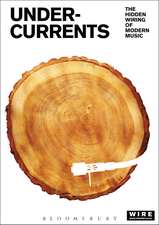The Contradictions of Jazz: Studies in Jazz
Autor Paul E. Rinzleren Limba Engleză Paperback – 15 oct 2008
Din seria Studies in Jazz
-
 Preț: 459.19 lei
Preț: 459.19 lei -
 Preț: 247.38 lei
Preț: 247.38 lei - 23%
 Preț: 579.83 lei
Preț: 579.83 lei -
 Preț: 435.66 lei
Preț: 435.66 lei - 23%
 Preț: 459.67 lei
Preț: 459.67 lei - 23%
 Preț: 454.08 lei
Preț: 454.08 lei -
 Preț: 484.94 lei
Preț: 484.94 lei - 27%
 Preț: 915.08 lei
Preț: 915.08 lei -
 Preț: 413.98 lei
Preț: 413.98 lei - 23%
 Preț: 474.65 lei
Preț: 474.65 lei -
 Preț: 305.09 lei
Preț: 305.09 lei - 23%
 Preț: 651.78 lei
Preț: 651.78 lei -
 Preț: 463.39 lei
Preț: 463.39 lei -
 Preț: 528.82 lei
Preț: 528.82 lei - 27%
 Preț: 1141.59 lei
Preț: 1141.59 lei - 23%
 Preț: 531.21 lei
Preț: 531.21 lei - 27%
 Preț: 763.94 lei
Preț: 763.94 lei - 23%
 Preț: 569.70 lei
Preț: 569.70 lei - 27%
 Preț: 1008.16 lei
Preț: 1008.16 lei - 23%
 Preț: 507.63 lei
Preț: 507.63 lei - 27%
 Preț: 932.18 lei
Preț: 932.18 lei - 23%
 Preț: 495.98 lei
Preț: 495.98 lei - 23%
 Preț: 528.81 lei
Preț: 528.81 lei - 23%
 Preț: 517.04 lei
Preț: 517.04 lei - 23%
 Preț: 492.58 lei
Preț: 492.58 lei - 23%
 Preț: 619.85 lei
Preț: 619.85 lei - 27%
 Preț: 1611.26 lei
Preț: 1611.26 lei - 23%
 Preț: 513.62 lei
Preț: 513.62 lei - 23%
 Preț: 579.76 lei
Preț: 579.76 lei - 27%
 Preț: 694.22 lei
Preț: 694.22 lei - 27%
 Preț: 720.72 lei
Preț: 720.72 lei - 27%
 Preț: 843.87 lei
Preț: 843.87 lei -
 Preț: 446.43 lei
Preț: 446.43 lei - 28%
 Preț: 349.39 lei
Preț: 349.39 lei - 28%
 Preț: 349.24 lei
Preț: 349.24 lei
Preț: 567.02 lei
Preț vechi: 736.40 lei
-23% Nou
Puncte Express: 851
Preț estimativ în valută:
108.50€ • 113.28$ • 89.80£
108.50€ • 113.28$ • 89.80£
Carte tipărită la comandă
Livrare economică 04-18 aprilie
Preluare comenzi: 021 569.72.76
Specificații
ISBN-13: 9780810861435
ISBN-10: 0810861437
Pagini: 210
Dimensiuni: 150 x 224 x 15 mm
Greutate: 0.36 kg
Editura: Rowman & Littlefield
Seria Studies in Jazz
ISBN-10: 0810861437
Pagini: 210
Dimensiuni: 150 x 224 x 15 mm
Greutate: 0.36 kg
Editura: Rowman & Littlefield
Seria Studies in Jazz
Notă biografică
Descriere
The Contradictions of Jazz examines four pairs of opposites in jazz-freedom and responsibility, creativity and tradition, individualism and interconnectedness, and assertion and openness-and explores their position and presence in jazz to create a humanistic and existential view of the genre.












